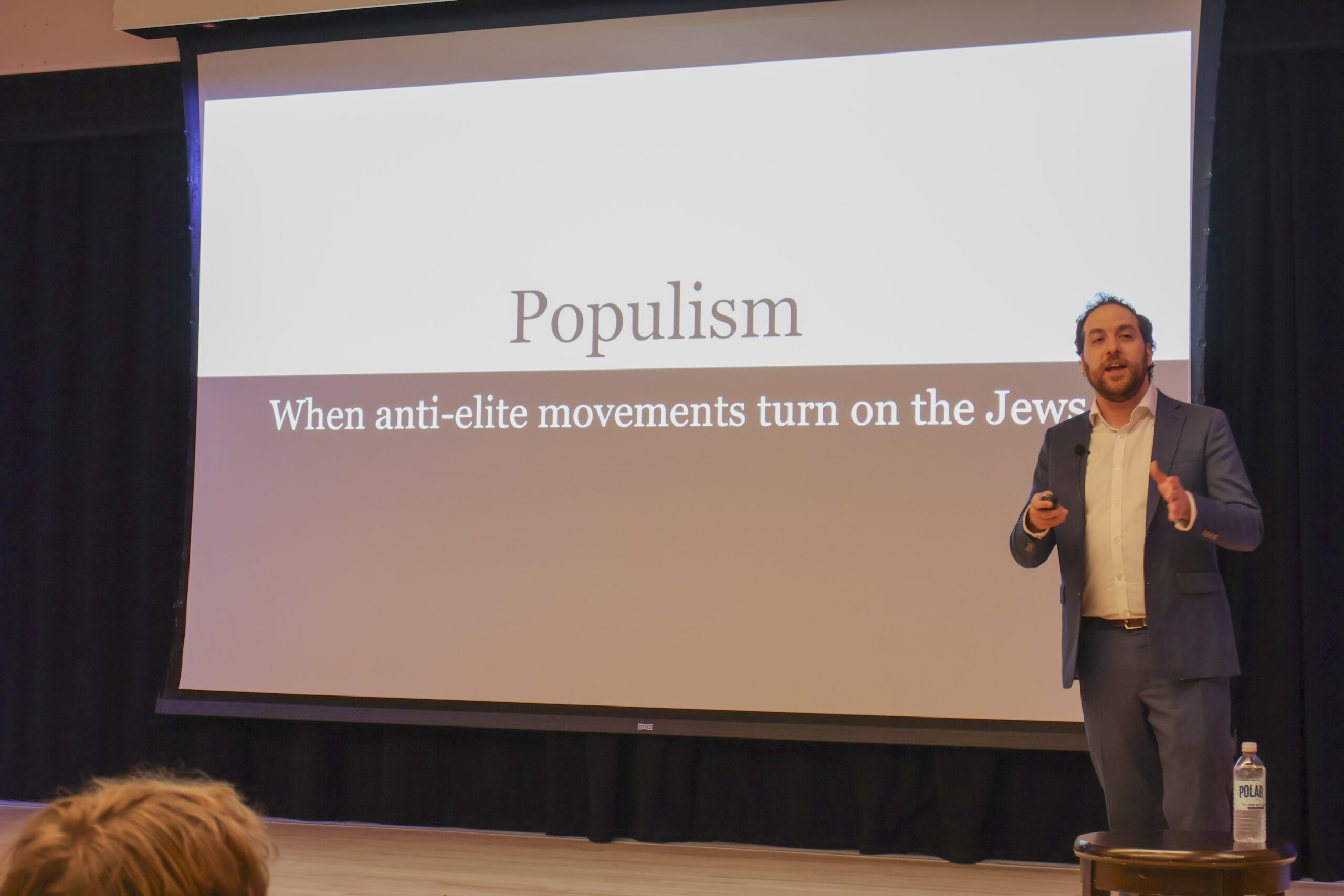Yair Rosenberg outlines reasons behind rising antisemitism
October 24, 2025
 Abigail Hebert
Abigail HebertOn Wednesday afternoon, Yair Rosenberg, a staff writer for “The Atlantic,” delivered a talk in Kresge Auditorium titled “The Turn Against The Jews: The Societal Shifts Behind American Antisemitism.” The talk was the second in the Viewpoint Exchange speaker series.
In his talk, Rosenberg outlined what he views as the reasons behind the rising tides of antisemitism.
“When you go and you talk about antisemitism…, there is an element of skepticism, because the issue has been politicized for a bunch of different reasons,” Rosenberg said. “Is it actually as bad as some people say? Is it getting worse, or has it always been this way, and people are just paying attention to it now? We now have a lot of data to actually show us what the problem looks like and whether it’s getting worse.”
Rosenberg began by noting the rise in antisemitism, especially among American youth, citing a 2024 poll by David Shor that states 25 percent of young people hold an unfavorable opinion of Jews. Notably, according to Rosenberg, the poll was specifically about Jews, not Israel or Zionism.
He then outlined the difference between the two major forms of antisemitism. This first he described as social discrimination, which he called “country club” antisemitism.
“Most people, when they think about antisemitism, they think about social prejudice, the same sort of prejudices unfortunately cast towards many minority groups,” Rosenberg said. “You know, ‘I don’t like you because you’re too Jewish, you’re too Muslim, you’re too black, you’re too gay,’ and so on, right?… That’s what you might call ‘country club’ antisemitism.”
Rosenberg contrasted this with what he described as the “antisemitic conspiracy view.”
“It’s the notion that whatever I perceive as wrong in the world is caused by the power structure, is the fault of Jewish people and groups of elite Jewish Kabbalists, the idea that Jews are to blame for social, political and economic problems in your society,” Rosenberg said.
Rosenberg went on to define what he views as the four main reasons behind the rise in antisemitism. The first he classified as a natural progression as society becomes further detached from the Holocaust. Rosenberg cited polls which show a dramatic increase in support for American Jews immediately following the Holocaust.
“I don’t think people quite realize just how much the Holocaust changed American attitudes towards Jews,” Rosenberg said.
Additionally, Rosenberg viewed the rise of populism as corresponding with a rise in antisemitism. He cited two specific examples from 2016 of a Donald Trump supporter and a Bernie Sanders supporter both blaming Jews for societal issues.
The third reason behind rising antisemitism, according to Rosenberg, was the influence of social media “supercharging” conspiratorial antisemitism through algorithmic radicalization. Finally, the fourth reason was the recent collapse of Israel as a consensus issue in American politics.
Rosenberg explained the link between criticism of Israel and antisemitism, while being clear that there is room for criticism of Israel without being antisemitic.
“I call this folk antisemitism, folk prejudice, because the average person is not coming to a lecture like this and saying, ‘Let’s have a thoughtful, sophisticated discussion where we can try to disentangle criticism of Israel and Zionism from criticism of Jews and antisemitism,’” Rosenberg said. “They see that, in high school, a kid is wearing a Star of David necklace. And they think that is Jewish, Jewish like Israel, Israel which I’m really angry about and hate because of X, Y, Z reasons. And then they go beat that kid up.”
Rosenberg finished his talk by reiterating the importance of discussions like these.
“When you understand a problem, it can feel depressing, but then you actually have the tools to look it in the eye and to do something about it. And I hope that’s where I leave you tonight,” Rosenberg said.
Attendee Tavi Greenfield ’27 came to the talk to better understand the role of antisemitism in today’s politics.
“As a Jewish student, preventing antisemitism is obviously something I care about, but I am also disheartened by how our government has been using accusations of antisemitism as an excuse to restrict academic and political freedom, so I was curious what an expert like [Rosenberg] would have to say about the topic,” Greenfield said.

Comments
Before submitting a comment, please review our comment policy. Some key points from the policy: